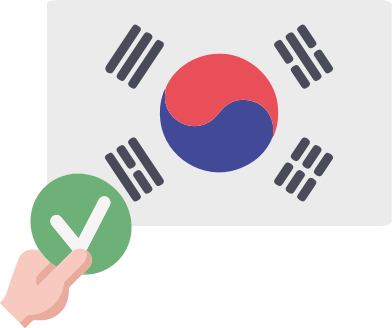South Korea Visa: Types and Policy
Information about South Korea visas for tourism, business and study
This guide to South Korea’s visa policy explains the different types of South Korea visas available.
You can use the information to decide whether you need a South Korea ETA or visa based on their nationality, the duration of their stay, and the purpose of their visit.
South Korea Visa Policy
South Korea has visa waiver agreements with more than 100 countries. This policy means that most visitors can enter South Korea and stay for a limited time without applying for a visa.
Whether or not you can take advantage of South Korea’s extensive visa-waiver program depends on your:
- Nationality
- How long you plan to stay
Travelers who are not exempt from visa requirements should apply at an embassy or consulate ahead of their trip.

Passports with visa-free entry: which countries do not need a visa for South Korea?
The list below shows all the countries eligible for the B1 visa exemption and the maximum number of days they may spend in the country visa-free.
Visa-fee visitors must now apply for a K-ETA before departure.
Africa (8):
- Botswana (90)
- Eswatini (30)
- Lesotho (60)
- Morocco (90)
- Mauritius 30)
- Seychelles (30)
- South Africa (30)
- Tunisia (30)
Americas (32):
- Antigua and Barbuda (90)
- Argentina (30)
- Bahamas (90)
- Barbados (90)
- Brazil (90)
- Canada (180)
- Chile (90)
- Colombia (90)
- Costa Rica (90)
- Dominica (90)
- Dominican Republic (90)
- Ecuador (90)
- El Salvador (90)
- Grenada (90)
- Guatemala (90)
- Guyana (30)
- Haiti (90)
- Honduras (30)
- Jamaica (90)
- Mexico (90)
- Nicaragua (90)
- Panama (90)
- Paraguay (30)
- Peru (90)
- Saint Kitts-Nevis (90)
- Saint Lucia (90)
- Saint Vincent and the Grenadines (90)
- Suriname (90)
- Trinidad and Tobago (90)
- United States (90)
- Uruguay (90)
- Venezuela (90)
Asia (9):
Europe (42):
- Albania (30)
- Andorra (30)
- Austria (90)
- Belgium (90)
- Bosnia and Herzegovina (30)
- Bulgaria (90)
- Croatia (90)
- Cyprus (30)
- Czech Republic (90)
- Denmark (90 days in 180-day period)
- Estonia (90 days in 180-day period)
- Finland (90 days in 180-day period)
- France (90)
- Germany (90)
- Greece (90)
- Hungary (90)
- Iceland (90 days in 180-day period)
- Ireland (90)
- Italy (90)
- Latvia (90)
- Liechtenstein (90)
- Lithuania (90)
- Luxembourg (90)
- Malta (90)
- Monaco (30)
- Montenegro (30)
- Netherlands (90)
- Norway (90 days in 180-day period)
- Poland (90)
- Portugal (90 days in 180-day period)
- Romania (90)
- Russia (60/90 days in 180-day period)
- San Marino (30)
- Serbia (90)
- Slovakia (90)
- Slovenia (90)
- Spain (90)
- Sweden (90 days in 180-day period)
- Switzerland (90)
- Turkey (90)
- United Kingdom (90)
- Vatican City (30)
Middle East (7):
- Bahrein (30)
- Israel (30)
- Kuwait (90)
- Oman (30)
- Qatar (30)
- Saudi Arabia (30)
- United Arab Emirates (90)
Oceania (14):
- Australia (90)
- Fiji (30)
- Guam (30)
- Kiribati (30)
- Marshall Islands (30)
- Micronesia (30)
- Nauru (30)
- New Caledonia (30)
- New Zealand (90)
- Palau (30)
- Samoa (30)
- Solomon Islands (30)
- Tonga (30)
- Tuvalu (30)
Special immigration policy for Jeju Island
Travelers must have K-ETA approval to visit Jeju Island under the visa-waiver program for up to 30 days.
To be eligible, foreigners must travel directly to Jeju island or have it named as the final destination.
Visitors from the following nations need a visa for Jeju Island:
- Afghanistan
- Bangladesh
- Cameroon
- Cuba
- Egypt
- Gambia
- Ghana
- Iran
- Iraq
- Kosovo
- Kyrgyz
- Nepal
- Nigeria
- Myanmar
- Pakistan
- Palestine
- Senegal
- Somalia
- Sri Lanka
- Sudan
- Syria
- Uzbekistan
- Yemen
This list is subject to change at short notice. Traveler must check the latest Jeju Island visa requirements for their nationality before departure.
South Korea Visa Types
You should consider several factors when deciding which type of South Korea visa you require.
The first relevant point is the number of times you would like to enter South Korea: both single and multiple-entry visas are available.
You can then select one of the South Korea visa listed below, based on your reason for entering the country and duration of your visit:
- ETA South Korea
- South Korea Tourist Visa
- South Korea Business Visa
- South Korea Family Visit Visa
- South Korea Work Visa
- South Korea Student Visa
- South Korea Working Holiday Visa
All visas must be obtained from a South Korea Embassy or Consulate. Only the South Korea ETA application process is fully online.

Information about the Korean Electronic Travel Authorization for visa-free entry
The ETA is for travelers who do not need a visa for South Korea.
Unlike when requesting of South Korean visas, there is no need to present paperwork in person at a diplomatic mission. The application is online.
South Korea Business Visa
General South Korean business visas are available to carry out activities such as:
- Engaging in commercial activities such as market research
- Business meetings
- Consultation
- Signing contracts
- Small-scale international trade
APEC Business Travel Card
Visitors of certain nationalities with an APEC Business Travel Card can enter South Korea for business trips for up to 90 days. APECs are issued to citizens of the following countries:
- Australia
- Brunei
- Chile
- China
- Hong Kong
- Indonesia
- Japan
- Malaysia
- Mexico
- New Zealand
- Papua New Guinea
- Peru
- Philippines
- Russia
- Singapore
- Taiwan
- Thailand
- Vietnam
South Korea Tourist Visa
If you are not eligible for the K-ETA, you need a tourist visa to visit South Korea on vacation. The South Korea tourist visa allows eligible foreigners to enter the country for any of the following purposes:
- Tourism
- Transit
- To visit a family member or friend
- To attend a religious, cultural, sporting, or music event
- Receive short-term medical treatment in South Korea
Short-term visa holders can stay in South Korea for up to 90 days. This permit is not valid to carry out paid work in South Korea and is intended only for leisure and recreational activities.
South Korea Student Visa
To study at a South Korean university or other educational institution, you can apply for a student visa.
South Korean student visas are issued either on a short-term basis, to complete studies lasting up to 90 days, or long term for extended periods of study.
Foreign students should examine all the different categories of study visas depending on the length of the course and the type of studies.
South Korea Work Visa
To carry out paid employment in South Korea must apply for a South Korea Work Visa.
There are multiple categories of work visas available including for professors, researchers, and technicians. There is also a work visa for job seekers.
Applicants must check the specific requirements depending on the job opportunity.
South Korea Family Visit Visa
A South Korean Family Visit Visa is required by people who will stay with a relative living in South Korea for more than 90 days.
This type of visa is also for a spouse of a South Korean national or the spouse or dependent child of an overseas Korean visa holder.
South Korea Working Holiday Visa (H-1)
South Korea has an agreement with several countries allowing young people to stay for 1 year and engage in some educational activities or employment.
The work visa is for people between the ages of 18 and 25 or 30. The main purpose of the trip should be a vacation with the work carried out to cover expenses.
There are some additional requirements for obtaining a working visa. These include having enough money to cover the beginning of the trip and having a clean criminal record.
This is a useful and popular option amongst young adults who would like to spend their gap year in South Korea.
The countries eligible for the South Korea Working Holiday Visa are:
- Australia
- Austria
- Belgium
- Canada
- Chile
- Czech Republic
- Denmark
- France
- Germany
- Hong Kong
- Hungary
- Ireland
- Israel
- Italy
- Japan
- Netherlands
- New Zealand
- Poland
- Portugal
- Spain
- Sweden
- Taiwan
- The U.K.
- US
Required Documentation for Different Visa Types
Few documents are required to obtain the online visa waiver for South Korea. You need a valid passport from a visa-waiver country and a completed online application form.
More documentation is required to apply for a traditional visa and a South Korean Embassy.
Applicants should make an appointment to present the visa form and supporting paperwork in person.
Basic document requirements
All visa applicants should have the following documents:
- Passport valid for a minimum of 6 months
- Passport-style photo which meets the specifications
- Proof of sufficient funds for the trip
- Payment of the visa fee
Additional travel documents for a visa application
Depending on the type of South Korea visa required, you’ll need to supply some additional documentation to support your application.
- Student visa: admission letter from the educational institution.
- Business visa: invitation letter from the host company.
- Short-term employment visa: employment contract.
How to Get Different South Korea Visa Types
To get a visa, you need to make an appointment at a South Korea Embassy or Consulate. You can download the relevant form and fill it in in advance.
You should then present the completed application form together with all the required supporting documentation, at the diplomatic mission. You’ll pay for your South Korea visa when you submit your request.
Applications can be made between 15 days and 3 months before the intended date of departure. Processing times vary depending on the embassy and demand.
The South Korea ETA application is 100% online. You receive the approved travel permit by email.
South Korea Visa Extension Policy
Visitors who wish to stay in South Korea beyond the expiry date on their visa can apply for an extension.
South Korea visa extensions can be made at the immigration offices in Seoul. Travelers are asked to complete an application form and provided proof of the need to stay in South Korea for a longer period.
The immigration officers will then decide whether the visa extension may be granted.